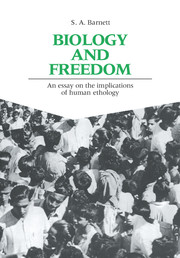Book contents
- Frontmatter
- Contents
- List of illustrations
- Preface
- Acknowledgements
- Part 1 An introduction
- Part 2 Homopugnax: the violent species
- Part 3 Homo egoisticus: the selfish species
- 6 Evolution and natural selection
- 7 Environment and heredity
- 8 Stories of human evolution
- 9 Darwinism, genetics and politics
- Part 4 Homo operans: the greedy species
- Part 5 Homo sapiens: the human species
- Glossary
- Notes
- References
- Name index
- Subject index
9 - Darwinism, genetics and politics
Published online by Cambridge University Press: 04 August 2010
- Frontmatter
- Contents
- List of illustrations
- Preface
- Acknowledgements
- Part 1 An introduction
- Part 2 Homopugnax: the violent species
- Part 3 Homo egoisticus: the selfish species
- 6 Evolution and natural selection
- 7 Environment and heredity
- 8 Stories of human evolution
- 9 Darwinism, genetics and politics
- Part 4 Homo operans: the greedy species
- Part 5 Homo sapiens: the human species
- Glossary
- Notes
- References
- Name index
- Subject index
Summary
The ethical progress of society depends, not on imitating the cosmic process, still less in running away from it, but in combating it.
T.H. HuxleyThis chapter could have been entitled ‘Social Darwinists and their Successors’. The expression, social Darwinism, is used for attempts to explain human society by evolutionary principles and, in particular, to support a conservative political outlook by reference to biological findings. The theories of evolution and of genetics have both influenced and been influenced by the social changes going on in the world outside. Here is an example.
R.A. Fisher and eugenics
One of the principal founders of modern biological mathematics was R.A. Fisher. Though he was an innovator, even his most original contributions depended on the work of many forerunners. Statistical analysis originated, in the seventeenth century, partly in response to problems connected with public health and with death rates. Among the questions examined by the pioneers was what premiums should be paid by persons who wished to insure their lives. Fisher's immediate predecessors included Francis Galton (1822–1911) and Karl Pearson (1857–1936). Both these brilliant men were energetically involved in applying mathematics and scientific findings to social issues.
Fisher's early work also included important contributions to the new science of genetics. The first successes in this field depended on the discovery of variation of genetically simple origin: for example, whether a fruit fly has red or white eyes.
- Type
- Chapter
- Information
- Biology and FreedomAn Essay on the Implications of Human Ethology, pp. 141 - 172Publisher: Cambridge University PressPrint publication year: 1989



